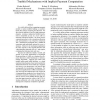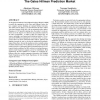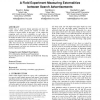121
click to vote
SIGECOM
2010
ACM
15 years 7 months ago
2010
ACM
This paper studies —from the perspective of efficient computation— a type of competition that is widespread throughout the plant and animal kingdoms, higher education, politic...
SIGECOM
2010
ACM
15 years 7 months ago
2010
ACM
We study a system where many identical users of a service share a common resource. Each user is sensitive to congestion at the resource, but also experiences a positive network ef...
126
click to vote
SIGECOM
2010
ACM
15 years 7 months ago
2010
ACM
It is widely believed that computing payments needed to induce truthful bidding is somehow harder than simply computing the allocation. We show that the opposite is true for singl...
124
click to vote
SIGECOM
2010
ACM
15 years 7 months ago
2010
ACM
We designed and built the Gates Hillman Prediction Market (GHPM) to predict the opening day of the Gates and Hillman Centers, the new computer science buildings at Carnegie Mellon...
115
click to vote
SIGECOM
2010
ACM
15 years 7 months ago
2010
ACM
We analyze the complexity of computing pure strategy Nash equilibria (PSNE) in symmetric games with a fixed number of actions. We restrict ourselves to “compact” representati...
SIGECOM
2010
ACM
15 years 7 months ago
2010
ACM
Recent years have seen extensive investigation of the information aggregation properties of prediction markets. However, relatively little is known about conditions under which a ...
SIGECOM
2010
ACM
15 years 7 months ago
2010
ACM
114
click to vote
SIGECOM
2010
ACM
15 years 7 months ago
2010
ACM
Current automated market makers over binary events suffer from two problems that make them impractical. First, they are unable to adapt to liquidity, so trades cause prices to mo...
112
click to vote
SIGECOM
2010
ACM
15 years 7 months ago
2010
ACM
“North” ads, or sponsored listings appearing just above the organic search results, generate the majority of clicks and revenues for search engines. In this paper, we ask whet...
111
click to vote
SIGECOM
2010
ACM
15 years 7 months ago
2010
ACM
The Combinatorial Public Projects Problem s an abstraction of resource allocation problems in which agents have preferences over alternatives, and an outcome that is to be collect...




